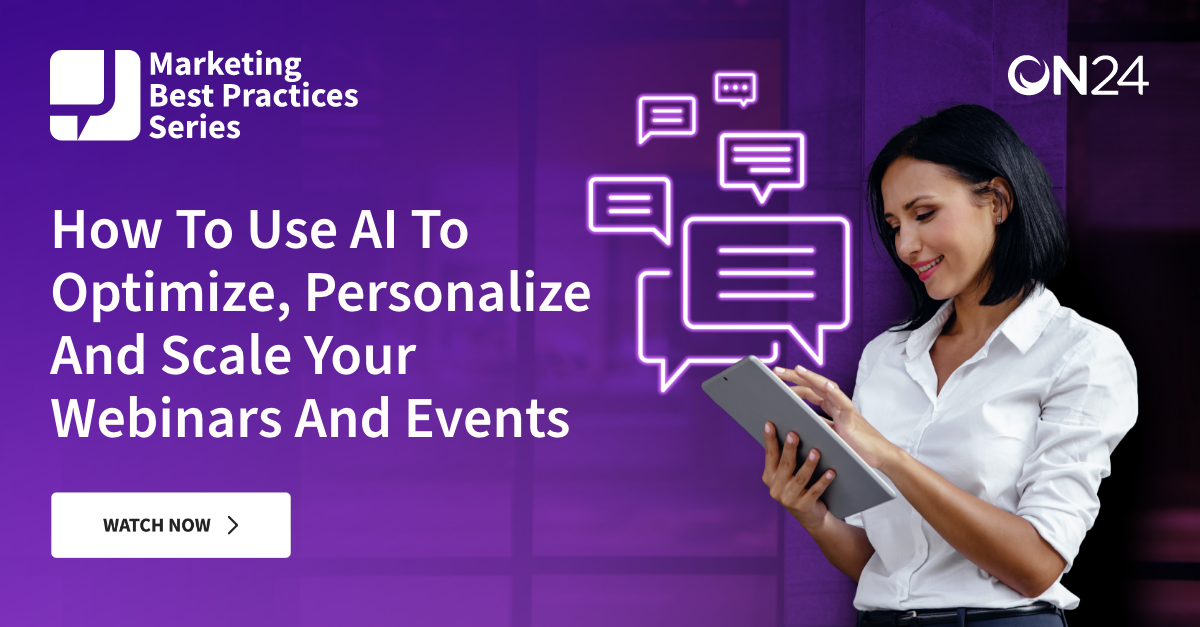Digital marketing has always been a fast-moving industry, but the introduction of artificial intelligence to marketing has added rocket fuel to today’s marketing machines. From content marketing and SEO to social media advertising and marketing automation, AI is revolutionizing how digital marketers engage with audiences and implement strategies.
AI has the potential to transform your marketing efforts and your ROI along with it. In this guide, we aim to show you how to leverage AI for digital marketing success.
What is AI in Digital Marketing?

AI in digital marketing refers to using artificial intelligence tools, like generative AI, to enhance the creation and implementation of digital marketing strategies. What this means in practical terms is wide-ranging but generally includes leveraging technologies like chatbots, marketing automation platforms and AI-powered analytics tools.
AI’s role in digital marketing extends beyond automation; it offers marketers the ability to analyze vast amounts of data, personalize customer experiences, and predict future trends with unprecedented accuracy. In fact, AI adoption is growing rapidly across industries:
-
- 80% of digital marketers reported using some form of AI technology in their strategies in 2023 (Marketing AI Institute).
- AI-driven personalization boosts revenue by up to 15% by tailoring content and recommendations to individual user preferences (McKinsey).
- Chatbots alone are expected to save businesses more than $8 billion annually through automation and efficient customer interactions (Juniper Research).
Why Use AI in Digital Marketing?

AI has the potential to reshape how digital marketing executes. From automating resource-intensive tasks to spotting possible missed opportunities in data, here are some reasons why you should consider incorporating it into your strategy.
Enhancing Personalization
Personalization is one of the most compelling use cases for AI in digital marketing. According to McKinsey, 71% of consumers say they expect personalization from the businesses they interact with, personalization is no longer an option.
However, manually creating personalized content for everyone is unrealistic. That’s where AI comes in.
With AI, businesses can quickly, accurately and efficiently create tailored content for diverse audience groups and individuals. AI analyzes customer actions to anticipate needs and decipher which content and product recommendations will resonate most.
By enhancing the user experience this way, AI-powered personalization doesn’t just boost engagement and improve conversion rates. It also creates a positive brand perception, which increases brand loyalty and maximizes customer lifetime value.
Harnessing Data Insights
Navigating and interpreting data is essential for any digital marketer, but it can often be tedious and time-consuming. AI-driven analytics tools can speed up and refine this process, extracting valuable insights from large datasets in just a fraction of the time it’d take a human.
But increased efficiency isn’t the only benefit of using AI for data analysis. Even if AI tools took just as long as a human would, they would still be worth using. This is because understanding patterns in data is what AI systems do best.
The machine learning models underpinning AI are essentially data analysis tools trained to recognize complex patterns and make predictions based on their findings. For this reason, AI analytics tools can spot trends that might be missed using traditional methods.
With AI-derived insights, digital marketers can develop a more precise understanding of audience preferences, which can then be used to optimize strategies with data-driven insights.
Streamlining Marketing Automation
There are many reasons why a digital marketer would use AI, but one of the biggest benefits is AI’s ability to help streamline marketing processes. AI can automate repetitive tasks, fill in reports and follow up on leads, allowing for big savings on time and resources.
The breadth of automation possible through AI covers everything from personalized email flows to customer service chatbots. AI tools designed for digital marketing can also monitor the performance of different ad campaigns, even optimizing copy and scheduling wherever opportunities arise.
By streamlining marketing automation, AI maximizes efficiency and gives marketers their most valuable asset back: time. With more time, marketers focus on what’s most valuable — usually on more creative tasks requiring human creativity and empathy.
How Are Digital Marketers Using AI?

Despite AI’s relative newness, it’s already an integral part of many digital marketers’ daily working processes. Here’s how you can use AI to supercharge your efforts.
AI in Content Marketing
AI uses what’s known as natural language processing to understand text in the same way that a human would. NLP has paved the way for natural language generation – where AI tools use their knowledge to produce their own original, human-like text.
This means that generative AI can create content autonomously — from blog posts to social media posts. Its role in content marketing doesn’t stop there — AI tools can also generate content ideas, personalize content around individuals’ needs and preferences and provide insights empowering marketers to optimize content marketing strategies.
Digital marketers increasingly include AI content marketing in their strategies because of its speed and agility. AI can significantly scale up content production by automating various processes and accelerating content creation, helping marketers meet the standards necessary to compete in today’s competitive landscape.
AI in Social Media Advertising
AI is revolutionizing the social media landscape, reshaping the way marketers administer campaigns, and transforming online customer interactions. From automating comment moderation to targeting insights, there’s very little it can’t help with.
When it comes to ad targeting, AI’s advanced algorithms can identify different audience groups, tailoring the ad copy to suit each segment. It can also provide recommendations for optimizing budgets and scheduling, depending on your criteria.
A/B testing is the cornerstone of successful social media advertising. Aside from streamlining the process through automation, AI tools can write ad copy variants and analyze historical data to predict which copy will perform best on each platform.
AI-powered chatbots are one of the most common forms of AI used in social media marketing. They can communicate with customers in real time, going beyond simple automated messages to deliver personalized responses that enhance the customer experience.
AI in SEO
Digital marketers are also using AI to drive efficiency in the SEO processes. There are tools that can carry out keyword research, brainstorm SEO content ideas, proofread and review content against a brief, and even generate code for technical SEO tasks.
The advanced nature of these tools means that they can also analyze user behavior and predict SEO trends, helping digital marketers prepare for algorithm updates and optimize site performance.
Ongoing data analysis is at the heart of any successful SEO strategy, and AI can quickly process vast volumes of data. This allows SEO marketers to accelerate various processes, saving time and enhancing their search engine marketing efforts.
Understanding AI in Digital Marketing

AI is a relatively new technology, and it can take time to fully understand how it works and what it can do within digital marketing. We’ve tried to make things a little easier by breaking down the concepts and technologies that are most relevant for marketers:
Demystifying AI for Marketers
The world of AI is full of complex concepts and jargon. If you’re a marketer trying to get your head around it all, here are the basics of what you need to know:
Generative AI
Generative AI is what most people think of when they think of AI. It’s the term used to describe AI that produces (generates) autonomously. Text-producing tools are examples of generative AI, but it’s also possible for AI to produce images and videos..
Predictive AI
Predictive AI is just as useful as generative AI, even though you might be less familiar with it. This technology can analyze large quantities of data and use the findings to predict future trends or events. By understanding patterns within data and turning them into valuable insights, predictive AI can help marketers to make informed decisions.
Machine Learning
The concept of machine learning is vital to understanding how AI is created. Machine learning is a dynamic process where computer algorithms go through a continual cycle of analyzing historical data and their own performance. These algorithms improve their efficacy by applying their learnings to future activity and then repeating the process.
Key AI Technologies

AI has produced a lot of technologies, with some providing more benefits to digital marketers than others. Here are some of the most important AI technologies for marketers to utilize:
-
- Integrated AI software: platforms that offer built-in AI features, like the ON24 Analytics and Content Engine, often use bespoke software. This means these AI features can be tailored to enhance different aspects of the platform while blending into the background of that solution.
- AI chatbots: can be used for generalized purposes such as content ideation and creation or for a more specific purpose. For example, ON24’s chatbot tool is designed to answer technical questions attendees may ask and provide additional information during webinars.
- AI-powered plugins: marketing automation is made easy with plugins that connect AI-powered software to other applications to create seamless marketing workflows.
The Impact of AI on ROI

AI can significantly improve ROI by boosting conversion rates, reducing customer acquisition costs, and improving customer engagement levels. By automating processes and creating personalized interactions, AI can lead to cost savings, increased revenue, and improved efficiency — ultimately positively impacting overall ROI.
Strategic Frameworks for AI Integration in Digital Marketing
Successfully incorporating AI into your digital marketing requires a clear, strategic framework to ensure alignment with your goals, seamless implementation, and long-term success. Following a structured approach helps you maximize the potential of AI while mitigating challenges. Here’s a step-by-step framework for integrating AI into your marketing strategy:
1. Define Your Objectives
Start with a clear understanding of what you want to achieve with AI. Are you looking to enhance customer personalization, improve campaign efficiency, or drive better data-driven decisions?
-
- Example: If your goal is to improve email engagement, AI tools like predictive analytics and A/B testing can optimize subject lines, timing, and content.
-
- Tie these objectives to measurable KPIs like increased click-through rates, conversion rates, or cost-per-acquisition reductions.
2. Audit Your Existing Marketing Processes
Analyze your current workflows to identify areas where AI can have the most significant impact.
-
- Look for repetitive tasks, such as social media scheduling, reporting, or lead scoring, that AI can streamline.
-
- Evaluate data quality: AI tools thrive on accurate, comprehensive data, so ensure your datasets are clean and well-organized.
3. Select the Right AI Tools
Choose tools that align with your objectives and are compatible with your existing technology stack.
-
- For personalization, consider AI platforms that analyze user behavior to deliver tailored content.
-
- For efficiency, use marketing automation tools that handle multi-channel campaigns.
-
- For insights, AI-powered analytics tools can extract trends and actionable recommendations from vast datasets.
4. Build an Implementation Roadmap
Establish a phased rollout plan to ensure smooth integration without overwhelming your team or existing systems.
-
- Start with a pilot project: Test a single AI-driven initiative, such as automating lead scoring, to assess effectiveness and ROI.
-
- Scale incrementally, introducing AI into additional areas of your strategy based on the outcomes of your pilot.
5. Invest in Team Training
AI tools are only as effective as the people using them. Ensure your marketing team has the skills and confidence to maximize the technology.
-
- Offer hands-on training sessions and access to vendor-provided resources.
-
- Foster a culture of collaboration where marketers can experiment with AI tools to discover innovative applications.
Trends and Predictions for AI in Digital Marketing
AI is reshaping digital marketing, and the rapid evolution of these technologies offers even more possibilities for businesses looking to stay competitive. By understanding emerging trends, marketers can leverage AI to elevate their strategies and connect with audiences in new ways.
Hyper-Personalization
The future of digital marketing lies in hyper-personalization. AI’s ability to process and analyze vast amounts of data will allow brands to create highly tailored experiences for individual users. Marketers will be able to anticipate customer needs with unmatched accuracy, crafting campaigns that adapt to each individual’s preferences in real time. This level of personalization will deepen customer engagement and drive higher conversion rates, as audiences feel uniquely understood and valued by the brands they interact with.
Creative Content Generation
AI-powered tools are advancing quickly in their ability to produce high-quality written, visual, and video content. These technologies are transforming the content creation process, helping marketers to streamline workflows and focus more on strategy and storytelling. In the near future, brands will be able to use AI to craft immersive campaigns that incorporate everything from automated blog posts to dynamic videos, enabling them to deliver impactful narratives that resonate deeply with their audiences.
Voice Search and Visual Search Optimization
As voice assistants and visual search tools become increasingly popular, marketers will need to adjust their strategies to keep up. AI will help businesses optimize content for natural language queries and refine image metadata to ensure better visibility in visual search results. This trend will not only make products and services easier to find but also ensure that brands remain relevant in a world where users expect seamless, intuitive interactions with technology.
Predictive Analytics
AI is poised to revolutionize marketing by shifting from reactive strategies to proactive ones. Predictive analytics powered by AI will enable marketers to foresee trends, identify opportunities, and mitigate risks before they occur. This capability will allow businesses to stay ahead of the competition, making data-driven decisions that ensure their marketing strategies are both innovative and effective.
Multichannel Campaign Coordination
AI is set to redefine how brands manage campaigns across multiple platforms. By analyzing audience behavior and coordinating messaging across social media, email, paid advertising, and more, AI will make it easier for marketers to create unified strategies that deliver consistent messaging. These seamless campaigns will enhance brand recognition and ensure that every customer interaction reinforces the business’s core message.
Leveraging AI in Digital Marketing

1. Assessing Your Needs
It’s easy to get excited about the possibilities of AI, but before implementing it in your digital marketing strategy, it’s essential to assess your specific needs. Identify your current challenges, future goals and potential “easy wins” of using AI — such as reducing repetitive administrative tasks.
Technology has a lot of potential, but if it’s not implemented with your goals, it will only be a distraction. Make sure you set clear objectives for what you’re trying to achieve with AI and regularly review how it’s being used if you want to get the most out of it.
2. Selecting the Right AI Tools
Once you’ve evaluated your needs and goals, the next step is to research and identify the tools that will help you achieve them. Aside from the obvious criteria, such as whether the tool has the features that you require, you should also consider things like:
-
- Compatibility with existing software systems
- Additional technical support needs
- How it could scale in the future
3. Training and Integration
No matter how great AI digital marketing tools can be, you’re unlikely to see the results you’re looking for without knowing how to use them properly. Effective training is vital to use these tools to their full potential – as is careful integration with existing workflows.

